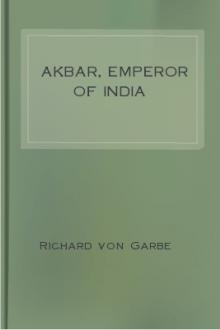Akbar, Emperor of India - Richard von Garbe (top 10 books to read txt) 📗

- Author: Richard von Garbe
- Performer: -
Book online «Akbar, Emperor of India - Richard von Garbe (top 10 books to read txt) 📗». Author Richard von Garbe
Sometime previous to these reforms Akbar had abolished a custom so disgusting that we can hardly comprehend that it ever could have legally existed. At any rate it alone is sufficient to brand Islam and its supreme contempt for followers of other faiths, with one of the greatest stains in the history of humanity. When a tax-collector gathered the taxes of the Hindus and the payment had been made, the Hindu was required "without the slightest sign of fear of defilement" to open his mouth in order that the tax collector might spit in it if he wished to do so.[11] This was much more than a disgusting humiliation. When the tax-collector availed himself of this privilege the Hindu lost thereby his greatest possession, his caste, and was shut out from any intercourse with his equals. Accordingly he was compelled to pass his whole life trembling in terror before this horrible evil which threatened him. That a man of Akbar's nobility of character should remove such an atrocious, yes devilish, decree seems to us a matter of course; but for the Hindus it was an enormous beneficence.
Akbar sought also to advance trade and commerce in every possible way. He regulated the harbor and toll duties, removed the oppressive taxes on cattle, trees, grain and other produce as well as the customary fees of subjects at every possible appointment or office. In the year 1574 it was decreed that the loss which agriculture suffered by the passage of royal troops through the fields should be carefully calculated and scrupulously replaced.
Besides these practical regulations for the advancement of the material welfare, Akbar's efforts for the ethical uplift of his subjects are noteworthy. Drunkenness and debauchery were punished and he sought to restrain prostitution by confining dancing girls and abandoned women in one quarter set apart for them outside of his residence which received the name Shâitânpura or "Devil's City."[12]
The existing corruption in the finance and customs department was abolished by means of a complicated and punctilious system of supervision (the bureaus of receipts and expenditures were kept entirely separated from each other in the treasury department,) and Akbar himself carefully examined the accounts handed in each month from every district, just as he gave his personal attention with tireless industry and painstaking care to every detail in the widely ramified domain of the administration of government. Moreover the Emperor was fortunate in having at the head of the finance department a prudent, energetic, perfectly honorable and incorruptible man, the Hindu Todar Mal, who without possessing the title of vizier or minister of state had assumed all the functions of such an office.
It is easily understood that many of the higher tax officials did not grasp the sudden break of a new day but continued to oppress and impoverish the peasants in the traditional way, but the system established by Akbar succeeded admirably and soon brought all such transgressions to light. Todar Mal held a firm rein, and by throwing hundreds of these faithless officers into prison and by making ample use of bastinado and torture, spread abroad such a wholesome terror that Akbar's reforms were soon victorious.
How essential it was to exercise the strictest control over men occupying the highest positions may be seen by the example of the feudal nobility whose members bore the title "Jâgîrdâr." Such a Jâgîrdâr had to provide a contingent of men and horses for the imperial army corresponding to the size of the estate which was given him in fief. Now it had been a universal custom for the Jâgîrdârs to provide themselves with fewer soldiers and horses on a military expedition than at the regular muster. Then too the men and horses often proved useless for severe service. When the reserves were mustered the knights dressed up harmless private citizens as soldiers or hired them for the occasion and after the muster was over, let them go again. In the same way the horses brought forward for the muster were taken back into private service immediately afterwards and were replaced by worthless animals for the imperial service. This evil too was abolished at one stroke, by taking an exact personal description of the soldiers presented and by branding the heads of horses, elephants and camels with certain marks. By this simple expedient it became impossible to exchange men and animals presented at the muster for worthless material and also to loan them to other knights during muster.
The number of men able to bear arms in Akbar's realm has been given as about four and a half millions but the standing army which was held at the expense of the state was small in proportion. It contained only about twenty-five thousand men, one-half of whom comprised the cavalry and the rest musketry and artillery; Since India does not produce first class horses, Akbar at once provided for the importation of noble steeds from other lands of the Orient which were famed for horse breeding and was accustomed to pay more for such animals than the price which was demanded. In the same way no expense was too great for him to spend on the breeding and nurture of elephants, for they were very valuable animals for the warfare of that day. His stables contained from five to six thousand well-trained elephants. The breeding of camels and mules he also advanced with a practical foresight and understood how to overcome the widespread prejudice in India against the use of mules.
Untiringly did Akbar inspect stables, arsenals, military armories, and shipyards, and insisted on perfect order in all departments. He called the encouragement of seamanship an act of worship[13] but was not able to make India, a maritime power.
Akbar had an especial interest in artillery, and with it a particular gift for the technique and great skill in mechanical matters. He invented a cannon which could be taken apart to be carried more easily on the march and could be put up quickly, apparently for use in mountain batteries. By another invention he united seventeen cannons in such a way that they could be shot off simultaneously by one fuse.[14] Hence it is probably a sort of mitrailleuse. Akbar is also said to have invented a mill cart which served as a mill as well as for carrying freight. With regard to these inventions we must take into consideration the possibility that the real inventor may have been some one else, but that the flatterers at the court ascribed them to the Emperor because the initiative may have originated with him.
(II, 372) because of the so-called "organ cannons" which were in use in Europe as early as the 15th century.
The details which I have given will suffice to show what perfection the military and civil administration attained through Akbar's efforts. Throughout his empire order and justice reigned and a prosperity hitherto unknown. Although taxes were never less oppressive in India than under Akbar's reign, the imperial income for one year amounted to more than $120,000,000, a sum at which contemporary Europe marveled, and which we must consider in the light of the much greater purchasing power of money in the sixteenth century.[15] A large part of Akbar's income was used in the erection of benevolent institutions, of inns along country roads in which travelers were entertained at the imperial expense, in the support of the poor, in gifts for pilgrims, in granting loans whose payment was never demanded, and many similar ways. To his encouragement of schools, of literature, art and science I will refer later.
Of decided significance for Akbar's success was his patronage of the native population. He did not limit his efforts to lightening the lot of the subjugated Hindus and relieving them of oppressive burdens; his efforts went deeper. He wished to educate the Mohammedans and Hindus to a feeling of mutual good-will and confidence, and in doing so he was obliged to contend in the one case against haughtiness and inordinate ambition, and in the other against hate and distrustful reserve. If with this end in view he actually favored the Hindus by keeping certain ones close to him and advancing them to the most influential positions in the state, he did it because he found characteristics in the Hindus (especially in their noblest race, the Rajputs) which seemed to him most valuable for the stability of the empire and for the promotion of the general welfare. He had seen enough faithlessness in the Mohammedan nobles and in his own relatives. Besides, Akbar was born in the house of a small Rajput prince who had shown hospitality to Akbar's parents on their flight and had given them his protection.
The Rajputs are the descendants of the ancient Indian warrior race and are a brave, chivalrous, trustworthy people who possess a love of freedom and pride of race quite different in character from the rest of the Hindus. Even to-day every traveler in India thinks he has been set down in another world when he treads the ground of Rajputâna and sees around him in place of the weak effeminate servile inhabitants of other parts of the country powerful upright men, splendid warlike figures with blazing defiant eyes and long waving beards.
While Akbar valued the Rajputs very highly his own personality was entirely fitted to please these proud manly warriors. An incident which took place before the end of the first year of Akbar's reign is characteristic of the relations which existed on the basis of this intrinsic relationship.[16]
VIEW OF FATHPUR
Bihâri Mal was a prince of the small Rajput state Ambir, and possessed sufficient political comprehension to understand after Akbar's first great successes that his own insignificant power and the nearness of Delhi made it advisable to voluntarily recognize the Emperor as his liege lord. Therefore he came with son, grandson and retainers to swear allegiance to Akbar. Upon his arrival at the imperial camp before Delhi, a most surprising sight met his eyes. Men were running in every direction, fleeing wildly before a raging elephant who wrought destruction to everything that came within his reach. Upon the neck of this enraged brute sat a young man in perfect calmness belaboring the animal's head with the iron prong which is used universally in India for guiding elephants. The Rajputs sprang from their horses and came up perfectly unconcerned to observe the interesting spectacle, and broke out in loud applause when the conquered elephant knelt down in exhaustion. The young man sprang from its back and cordially greeted the Rajput princes (who now for the first time recognized Akbar in the elephant-tamer) bidding them welcome to his red imperial tent. From this occurrence dates the friendship of the two men. In later years Bihâri





Comments (0)